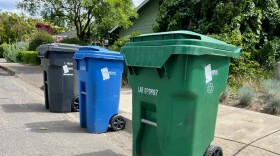Oregon has become the first state to require paper and packaging producers to pay fees into a statewide recycling and waste prevention system.
Oregon’s Recycling Modernization Act went live on Tuesday. That’s when large companies that sell paper or packaging in Oregon had to start paying into the system.
A handful of states have passed laws requiring businesses to share the costs of managing packaging waste. Oregon’s program is the first to officially launch.
For most Oregonians, the initial change may be imperceptible, but the gears have started turning. Over the next few years, cities with more than 4,000 residents will need to start offering recycling and to accept those same materials. Smaller cities can opt into the system.
In the end, this new system will bring curbside recycling services to more than 150,000 households that don’t currently have them.
“Some communities are more ready than others,” said Arianne Sperry, Oregon Department of Environmental Quality recycling program manager. “So how fast people experience change will depend on where they live and work.”
More than 1,500 companies will need to start paying fees for the packaging and paper they sell in Oregon.
Local and out-of-state businesses with global revenues of $5 million or more will need to pay those producer fees to help pay for recycling services, like helping local hauling companies purchase new trucks and recycling bins. Funds will also help local governments administer the program and educate ratepayers about what is or isn’t recyclable.
This new recycling system came out of legislation passed in 2021. That law was a response to a global recycling disruption that began in 2017, when China — the world’s largest importer of recyclables — stopped accepting several types of waste due to high levels of contamination.
Since then, more domestic companies have cropped up to fulfill the nation’s demand for a place to recycle their trash, particularly plastics — according to Kim Holmes, executive director of Circular Action Alliance, the nonprofit charged with collecting and administering producer fees.
“There is no struggle in finding end markets,” Holmes said. “We have homes for all of the materials we currently have.”
The law requires recyclables to go to “responsible end markets” — that is, businesses that recycle materials in a way that doesn’t have major environmental or public health consequences. The statewide recycling list is based on materials that have such end markets.
This story comes to you from the Northwest News Network, a collaboration between public media organizations in Oregon and Washington.




